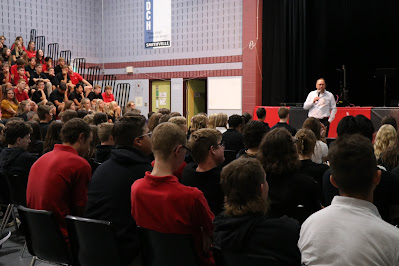Jesus said
he came to give us “life to the full,” said Karmyn Bokma at the start of the
third chapel during Spiritual Emphasis Week. “So why are there so many days when
we don’t feel like that? So many days I wake up and I ask, ‘is that even true?’
”
Bokma, a
pastor and speaker from Burlington, said we often put labels on ourselves that
shape our identities. Being a good student, or being a good athlete, or having
a lot of friends. But we can also label ourselves with our mistakes, our feelings
of failure, our shortcomings.
Bokma said
when she was a student, she had a summer job with Athletes in Action. During a
particularly challenging training exercise her team had to complete a series of
relay challenges with each team member carrying a heavy rock during their part
of the challenge.
“The
challenges weren’t that hard, but when it was my turn, I just kept thinking how
much it sucked to have to carry the rock,” Bokma recalled. “It was so hard, and
it would have been so much easier if I didn’t have to carry that rock.”
Bokma said
some of the labels we carry are very good things. Being a good student. Having
lots of friends. Being a good athlete. But when being a good athlete is our identity,
and we have a bad game or have a bad shift, it shakes our sense of self-worth. If
we don’t get invited to the party or we don’t get enough likes, we question our
value. Our label gets in the way and it’s like we are carrying a rock.
The full
life that is promised to us in Jesus can’t be ours when we let other labels get
in the way or drag us down, she said. “How many times have I let these labels
dictate how I feel about myself or how I live my life,” she said.
In the
story of the burning bush in Exodus chapters 3 and 4, Moses has an encounter
with God. God is present, he gives Moses a promise, he says there will be miracles,
and he says that Moses cannot fail. Yet Moses still lets his identity – “I am
not a good speaker” – shape his response to God. The “God of the universe” is talking
to Moses, but Moses still pushes back, Bokma said.
“Someone in
his past told him he was not good enough and Moses was about to let a label prevent
him from participating in the story of redemption, the biggest moment in
history.”
In the same
verse in the gospel of John (John 10:10) where Jesus promises life to the full,
he also says a thief comes to kill and destroy. That thief is what distracts
you from your identity as a beloved child of God, she said.
Bokma said
she was adopted as an infant into a loving family, but on her 18th
birthday, her adoptive family gave her details about her birth, and a letter
from her birth mother. In the letter, her mother explained that she had given
her baby up for adoption because she was single and wanted her child to have
two parents. When Bokma reunited with her birth mother several years later, she
learned that her mother had only known her father for a few hours and then
never saw him again.
“I learned
that I am here because of a rape,” Bokma said. “But in that moment, God
reminded me that I am a beloved child, and that he had planned and purposed my
life.” Bokma said despite the pain of that beginning, she will forever be
grateful for her mother’s courage and bravery, “and participation in the plan
God had for my life.
“God says the
exact same thing to you,” Bokma told students. “ ‘ I made you the way you are
on purpose, and you are my child. There is work that Jesus wants you to do.’
“God wants
you to know that you are his. You are enough. You are loved.”
Chapel host
Joel started the day with a hula hoop contest, and a student praise team led in
worship with Child of Love, Cornerstone, No Longer Slaves, and Days
of Elijah.
Questions
for Discussion
1. Just for fun: share if you have any
other names you go by. Any nicknames?
Family names?
2. Talk about the ideal of “labels” as
a group. How relevant do you feel that
this is for students? What are some ways
we can struggle with labels? What is a
positive outcome for there being different labels that we wear (this isn’t a
trick question!), and one negative outcome for there being different labels.
3. Have a few people read out loud
these passages:
-
Zephaniah 3:17, Jeremiah 31:3, 1 John 3:1, Ephesians 2:10
-
What
stands out to you as you hear them?
-
Take
a minute to just sit and let God remind you of how loved you are.
4. If it feels safe, share with your
group a label or identity that you hold on to.
(And if someone in the group shares, the rest of the group’s job is to
listen with respect and thank them for sharing!) If it feels too awkward to
share, spend time praying together that we would fully and wholly experience
God’s love today and feel like we don’t need to hang on to labels.













































.jpg)

.jpg)






